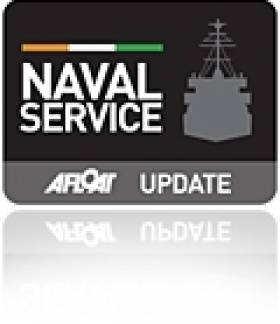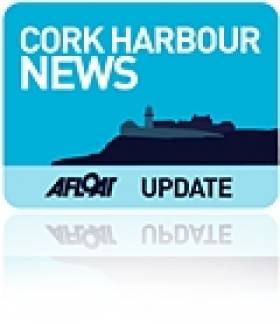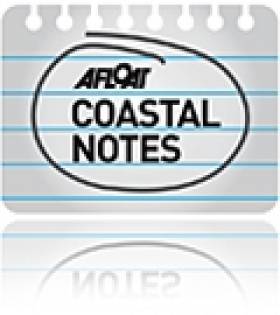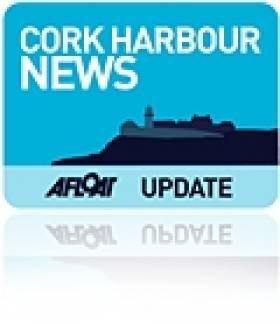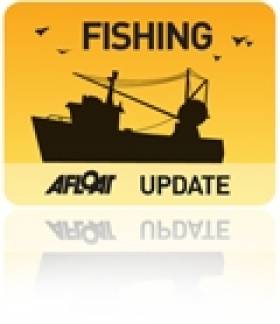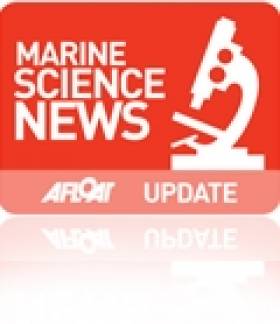Displaying items by tag: Simon Coveney
First Meeting of Government Taskforce on Treatment of Workers of Irish Fishing Trawlers
The Minister for Agriculture Food and the Marine, Simon Coveney yesterday chaired the first meeting of the Government Taskforce on allegations regarding the treatment of workers on Irish Fishing Trawlers. Minister of State Ged Nash at the Department of Jobs, Employment and Innovation also attended the meeting.
The decision to establish a high level inter-departmental taskforce to examine the wide range of issues identified in the recent Guardian newspaper report, was taken at a Cabinet meeting earlier this week. The meeting which considered the complex issues arising from the Guardian article and discussed the most appropriate cross Departmental response, included high level representatives from the Departments of Justice, Jobs Enterprise & Innovation, Transport, Tourism and Sport and Agriculture, Food and Marine, the Attorney General’s office, An Garda Síochána, BIM, the Naval Service and the Sea Fisheries Protection Authority.
Speaking after the meeting, Minister Coveney, said, “this is an issue that the Government is committed to resolving. Already a lot of work has been done on tackling work and safety related issues in the fishing industry. Today this Task Force committed to produce a co-ordinated cross Departmental response. The issues covered were information sharing, enforcement, permitting, licensing, exploitation, and trafficking.”
The Minister added “It is essential firstly to establish a full understanding of the complex issues involved and the meeting today has allowed all the State Authorities to share information on their individual remit and experiences. I want to see a joined up State response. Where appropriate we need to take robust and proportionate immediate actions. We also need to develop any medium term changes to the regulatory and enforcement frameworks of the State”
The next meeting has been arranged for Thursday 12th November and it is planned to invite the Migrant Rights Centre of Ireland, the International Transport Workers Federation (ITF), a Guardian journalist and the four Fishermen’s Producer Organisations, to make individual presentations to the meeting.
Coveney Welcomes Mackerel Negotiations in Clonakilty
Minister for Agriculture, Food & the Marine, Simon Coveney TD today welcomed the start of important international negotiations on the mackerel stock in the North East Atlantic. The negotiations are being hosted by the Department of Agriculture, Food & the Marine on behalf of Ireland in the National Seafood Centre in Clonakilty, County Cork.
Minister Coveney said that “I am very pleased that Ireland is hosting these negotiations. Mackerel is the single most important stock for the Irish fleet and we need to secure agreement at international level on management arrangements for this stock. I very much hope that agreement on a sustainable strategy can be reached this week at what I am sure will be intensive and difficult talks.”
The aim of the negotiations is to try and reach agreement between the EU, Norway, Iceland & the Faeroe Islands on the total allowable catch (TAC) for mackerel for 2016. The Russian Federation and Greenland will also participate as observers. Up to 70 international delegates are expected in West Cork for the three day negotiations.
Minister Coveney went on to say that "Mackerel is very important both for the Irish catching sector and to our seafood processing industry in Donegal and along the western seaboard and provides significant seasonal employment in Donegal, Galway, Kerry and Cork. Our aim this week and always is to have a sustainable long term management strategy for this vital shared stock.”
Officials from the Department of Agriculture, Food and the Marine, supported by scientists from the Marine Institute will represent Ireland at these negotiations.
Coveney Inspects Progress On €6m Dredging Works At Dunmore East Fishery Harbour Centre
During his visit to the South East, The Minister for Agriculture, Food and the Marine, Simon Coveney TD, took the opportunity to inspect progress on the €6m dredging works at Dunmore East Fishery Harbour Centre. The works which involve removing approx 27,000 metres cubed of material located in the harbour basin and in the approach channel to the port, commenced in June and are substantially completed.
The Minister said “I am delighted to hear that the dredging project in Dunmore East is progressing according to plan and within budget. When completed it will transform the harbour for all our users and play an important part in increasing economic activity and creating much needed jobs here in the South East.”
The material in the harbour basin which was heavily contaminated has now been successfully dredged, treated and removed from the harbour, work is set to commence on removing approximately 6000 metres cubed of material from the entrance channel which is not contaminated. It is expected that the works will be fully completed by the end of November.
The Minister went on to say “These works will remove the operational difficulties experienced by fishermen, landing times and vessel management will be much improved as will the availability of the syncrolift, which is required to raise vessels to facilitate their repair and maintenance. Marine leisure users will also see benefits and overall the harbour will be more attractive operationally for the increasing cruise liner traffic.”
The Minister concluded saying “These much needed works are a sign of my Governments commitment to the South East and complement other recent investments in Dunmore East on the new and enlarged slipway for marine leisure and fisheries users and also the newly opened harbour user’s facilities in the ground floor of the Harbour Management Building.”
As part of his visit to the South East today, Minister Coveney met with local fishing industry in Kilmore Quay to discuss the introduction of the first phase of the new landing obligation or ‘discards ban’ for the whitefish fleet.
Minister Coveney said “Today was an opportunity for me to outline what has been agreed in terms of the phasing in of the landing obligation under the new Common Fisheries Policy for our whitefish fleets. Just as importantly, it was an opportunity for me to listen to the concerns of our fishing industry with regard to this major change in the way our fleets will operate in the future.”
Naval Vessel L.É. Niamh Departs Cork to Assist in the Humanitarian Crisis in the Mediterranean
#navy – L.É. Niamh under the command of her captain, Lieutenant Commander Daniel Wall departs the Naval Base, Haulbowline this evening, en route for the Mediterranean to assist the Italian authorities in the humanitarian operation to rescue migrants fleeing North Africa.
The Minister for Defence, Mr. Simon Coveney, T.D., had announced earlier this month that L.É. Niamh would deploy to the Mediterranean to continue Ireland's contribution to the search and rescue mission. L.É. Eithne has spent the past eight weeks in the Mediterranean and has set out on her return to Irish shores. A total of 3,377 people have been rescued by L.É. Eithne from the waters between Libya and Sicily.
Defence Minister Simon Coveney said "I had the opportunity of visiting L.É. Eithne last Tuesday. I conveyed to the personnel our deep appreciation for the outstanding manner in which they performed their duties on overseas service on behalf of the Government and the people of Ireland. I am pleased to be here today to convey my appreciation to you, in advance of your deployment."
L.É. Niamh with a crew of 55 Naval Service personnel and 2 medics from the Army Medical Corps will continue the remarkable work started by L.É. Eithne. The Minister went on to say "L.É. Niamh is expected to be deployed in the Mediterranean until September, dependent on the operational demands and requirements arising."
The Minister concluded by saying "I want to wish Lieutenant Commander Daniel Wall and the crew of L.É. Niamh a safe and successful mission. You are travelling to the Mediterranean with my best wishes and with those of the rest of the nation."
Marine Plan Could Deliver An Additional 29,000 Jobs
#oceanwealth – Addressing the second 'Harnessing Our Ocean Wealth' Conference today, in Ringaskiddy, Co. Cork, Simon Coveney TD, Minister for Agriculture, Food and the Marine outlined new economic research that indicates the Government's blueprint for the marine which could deliver more than 29,000 additional jobs and an additional €2.7bn in economic growth by 2020. Downloasd speech below.
Minister Coveney said that "Ireland is now firmly on what I believe is an unstoppable journey of marine expansion. We are experiencing a significant period of 'blue growth' with a 9% increase in growth in Ireland's marine sector over the last five years and the ocean economy now valued at 1.3% of GDP. Today we are building on this progress with the publication of a development framework for the marine sector, coupled with the clear commitment from Government to introduce a marine spatial planning process for the country, which will underpin the achievement of these economic targets as the Harnessing Our Ocean Wealth strategy is implemented."
Ireland's Ocean Economy report and associated research on the downstream impacts of the marine, produced by the Socio Economic Marine Research Unit at the National University of Ireland states that if HOOW targets are met, 29,300 new jobs could be created by 2020, with 16,100 projected to come directly from the marine sector. An additional growth of €2.7bn in the wider economy is also expected.
The report also confirms the current value of the blue economy. In addition to the 18,400 individuals currently directly employed in our marine industries, a further 13,000 are employed indirectly across the wider economy, creating an additional €3.3bn in turnover. For every €100 turnover created from our ocean economy, a further €78 is created indirectly in other sectors.
The Minister encouraged members of the public to attend the Seafest 2015 open day on Saturday in Ringaskiddy "Members of the public will be able to access a state of the art stimulator that is used to train ships' captains and visit seafood cookery demonstrations. They will also be able to experience what it's like to be exposed to hurricane force winds through the BIM Beaufort Scale Hurricane Experience. There will be an extensive seafood fair and cookery demonstrations and multiple other activities on and off the water. This event is free of charge for every age group with lots of family activities planned."
The Conference included contributions from Minister Coveney, Alex White, T.D., Minister for Communications, Energy and Natural Resources; Sean Sherlock, T.D., Minister for Research & Innovation; and Mr Paudie Coffey T.D., Minister of State at the Department of the Environment. Commissioner Karmenu Vella, Environment, Maritime Affairs and Fisheries European Commission and Rt. Hon. Darin King, Minister of Business, Tourism, Culture in the provincial government of Newfoundland and Labrador also spoke at the Conference.
This second annual Conference which reviewed ongoing progress on implementation of the Government's Integrated Marine Plan (published in 2012) was attended by over 500 delegates from the public and private sector with an involvement in the marine sector.
In concluding his address, Minister Coveney said "I believe that the outlook for the sector is really exciting and the possibilities are endless. The challenge now is to make the marine sector a leading contributor to the Irish economy and to recognise the potential we have as an island nation to be a major player in the sector internationally."
#haulbowline – The toxic site at Haulbowline in Cork Harbour looks set to be cleaned up following a Government decision to allocate a total budget for the island remediation project of €61m.
Commenting at the decision, the Minister for Agriculture, Food and the Marine, Simon Coveney TD said "I welcome the approval of this very significant €61m in funding to take a "whole of island" approach to the remediation of Haulbowline Island. We have already seen An Bord Pleanála and the EPA give approval for the remediation project and the completion of crucial work to repair the Haulbowline Island access Bridges. While analysis, testing, design and enabling works have been continuing we can now look forward to the core remediation work at Haulbowline Island including remediation of the East Tip, former steelworks factory site and south tip".
In 2011, As Afloat reported, Europe gave a deadline of three months to 'clean up' the site. Earlier this year, there was speculation the cleaned up site could be a future hub for international yachting.
The Minister went on to say "The next phase of the project, following the agreement of my Cabinet colleagues, is the most complex phase to date and is expected to take approximately six months to complete, following the appointment of Consultants. This will lead to commencement of initial elements of the core remediation 'clean-up' phase on site, by late 2015. This work will intensify into 2016 and 2017 with significant progress towards completion of the project expected by late 2017. There will be significant construction activity on the island, it will bring substantial benefits to the local economy and transform the Island into a genuine national infrastructural asset. "
The Government approved a proposal to enable the clean-up of the East Tip on Haulbowline Island in 2011. Cork County Council is acting as agent of the Minister in the remediation of the site. Key milestones of the remediation project were the planning application for works on the East Tip, lodged with An Bord Pleanála in October 2013 and the waste licence application, submitted to the Environmental Protection Agency in November 2013. The approval of both planning and waste licence applications which involved complex and detailed preparatory work cleared the way for the completion of the project in the East Tip. Today the Government has agreed a total budget of €61m for the remediation of all areas of the island (East Tip, South Tip and former steelworks site) and not just the East Tip which is the focus of an ECJ judgement.
Haulbowline Island is located within Cork Harbour, between Cobh to the north and Ringaskiddy to the south. The East Tip contains approximately 650,000m3 of steelworks waste that was deposited on a sand spit over a 40 year period. The demolition of the former steelworks has also left a large site in the centre of the island that is unusable pending remediation. Access to the Island by road is from Ringaskiddy via bridges which transverse Rocky Island.
€6m Dunmore East Harbour Dredging Works Commence in June
#dunmoreeast – The Minister for Agriculture, Food and the Marine, Simon Coveney TD, today announced details of a €6m dredging project, which his Department has awarded for works at Dunmore East Fishery Harbour Centre. The contract to complete the works was awarded to L&M Keating Ltd. following a competitive tendering process. It is anticipated that the works will commence next month and be substantially completed by the end of September.
Whether it is a suitable harbour for a marina has been the focus of some intense debate on Afloat.ie
On making the announcement the Minister said "I am delighted to be able to announce that the much needed dredging works in Dunmore East will commence shortly following the award of the contract. The Fishery Harbour Centre at Dunmore East is an important piece of infrastructure which is the bedrock of the local community and is integral to the Governments policy to further develop our fishing industry, the wider seafood sector and indeed other ancillary and marine leisure industries."
Years of siltation in the harbour has restricted vessel traffic and made manoeuvrability and fish landings problematic for fishermen. This maintenance dredging operation will cover the harbour area itself and the entrance channel to the Harbour basin. The Minister went on to say "Today's announcement is a further indication of this Governments commitment to the fishing industry in the South East. When complete, not only will the harbour be more accessible to larger vessels, landing times and vessel management will be much improved as will the availability of the syncrolift, which is required to raise vessels to facilitate their repair and maintenance."
The volume and value of fish landings into Dunmore East have increased significantly in recent years, and the size of fishing vessels using the harbour have also increased. Currently the siltation impedes their ability to operate efficiently, while making the syncrolift unusable.
Concluding the Minister said" This is the single largest capital investment in our Fishery Harbour Centres this year, and when complete, the Dunmore East Harbour will be well equipped to attract larger Irish and foreign fishing vessels, while also benefiting other commercial and leisure harbour users. It will complement the works carried out in 2013 and 2014 to create a new and enlarged slipway for marine leisure and fisheries users and also the newly opened harbour user's facilities in the ground floor of the Harbour management Building. Those works and the new €6m dredging contract announced today will improve the utilisation of the infrastructure in Dunmore East and will help to stimulate further economic development in the area with a spin off for local job creation"
#moth – Stewart Hosford, the yacht racing industry executive who identifed Cork harbour's potential as a 'Global Yacht Racing Hub', has signed up a top Chinese Asset Management company as a sponsor of a high profile Moth regatta.
At a press briefing held at the Royal Thames Yacht Club, London, ZhongJin, one of Shanghai's leading Asset Management companies, was announced as Primary Regatta Sponsor for the 2015 Shanghai International Regatta. The Shanghai International Regatta presented by ZhongJin, is the first professional sailing event to take place on the Huangpu River.
Hosford, who grew up in Cork and manages British solo sailor Alex Thomson, said last October he was in 'discussions' to see how he can support Minister Coveney's ambitions for Cork Harbour.
Hosford, Managing Director of 5 West Ltd, co-organiser of the Chinese regatta commented: "We are delighted to welcome ZhongJin as Primary Regatta Sponsor for the first Shanghai International Regatta. ZhongJin are a highly respected organization in Shanghai, so it is fantastic that they have given their support to our regatta."
Also announced was the line-up of sailors due to take part in the Moth Invitational section of the regatta. Leading international sailors, including Chris Rashley (GBR), Josh McKnight (Aus) and Kalle Costa (NED), will make up a fleet of 12 Moths competing on the Huangpu River.
Chris Rashley who has finished in the top 5 in the last two Moth World Championships is very excited to be making history in Shanghai: "I am very much looking forward to competing in the Shanghai International Regatta presented by ZhongJin. I have been privileged to sail in some amazing places in my career, so to be one of the first professional sailors to compete on the Huangpu River is a fantastic."
Previous America's Cup World Series syndicate, China Team, will represent China in a head to head Match Racing series in M2 Catamarans against Team GREAT Britain. Team GREAT Britain will race under the colors of The GREAT Britain Campaign, which works to showcase the very best of what Britain has to offer. At the Press Briefing, China Team was represented by Chinese Olympic Gold Medallist Xu Lijia and Team GREAT Britain was represented by British ocean racing star Alex Thomson, both of whom are Official Regatta Ambassadors. The crews for both teams will be announced in the coming weeks.
Progess at Blue Whiting Fisheries Negotiations in Ireland
#fisheries – Minister for Agriculture, Food and the Marine, Simon Coveney TD today welcomed the progress made at the international Blue Whiting Fisheries negotiations in Clonakilty.
The Minister said "I am pleased that serious efforts were made this week to resolve the contentious issue of how this important fish stock is shared between the various parties. The current sharing arrangement for this large fish stock, which is heavily fished to the north west of Ireland and Scotland in the springtime, has broken down .The European Union and other parties are looking for a fairer long term sharing arrangement of this valuable resource."
The Minister reported that at this week's negotiations "The European Commission made a strong case for an increased EU share, which would also mean an increase in Ireland's quota. It's unfortunate that a final agreement was not possible with our international partners in this fishery but substantial progress was made in the negotiations. I am hopeful that an equitable sharing arrangement can be found when the parties next meet."
Negotiations on international management of the very large North East Atlantic Blue Whiting fishery began last Tuesday and were hosted by Ireland on behalf of the European Union at the National Seafood Centre in Clonakilty, Co. Cork. Delegates from France, United Kingdom, Spain, Sweden, Denmark, Netherlands Norway, Iceland, Faeroes Islands, as well as Ireland were in attendance.
The European Commission had requested that Ireland host the talks on behalf of the European Union at the National Seafood Centre. Fishing industry representatives were also present to monitor the negotiations. The Blue Whiting fishery is very important to Ireland and for 2015 the Irish quota is over 23,000 tonnes.
This quota is landed directly into Killybegs and is increasingly processed for human consumption in fish factories in Killybegs , who have pioneered the use of this resource for human consumption. In addition to the catch by the Irish fleet, vessels from Norway & the United Kingdom have landed over 32,000 tonnes of Blue Whiting into Killybegs this year, creating additional employment in the fish processing industry.
Scientific Transatlantic Mapping Between Ireland & Canada Begins
#mapping – The Minister for Agriculture, Food and the Marine, Simon Coveney TD today joined with Carlos Moedas, European Commissioner for Research, Science and Innovation, and Karmenu Vella, Commissioner for Environment, Maritime Affairs and Fisheries in Brussels, along with Canada's Minister of Fisheries and Oceans Gail Shea, to announce the first trans-Atlantic mapping survey to take place under the Atlantic Ocean Research Alliance.
The Irish research vessel, RV Celtic Explorer will undertake a mapping expedition between St. John's, Newfoundland, Canada and Galway in Ireland in June of this year, as scientists from the Marine Institute, Ireland will be joined by a multi-national team made up of USA, Canadian and European ocean mapping experts. This is an important step following the agreement reached at Galway in May 2013 and is an example of scientific diplomacy in action.
Speaking from Brussels, Minister Coveney said "Information from the sea-floor is vital to the sustainable management of the Atlantic as well as to important industries such as fisheries, aquaculture and tourism. Ireland has developed a world-leading reputation for sea-bed mapping and is also very committed to the implementation of the Galway Statement and so I am delighted to put at the disposal of the team, Ireland' state-of the art research vessel-RV Celtic Explorer."
Commissioner Moedas stated "I am committed to harnessing the societal and economic value of our oceans, while protecting fragile marine ecosystems. Under Horizon 2020 we have invested just under €70 million to support the Galway Statement follow-up. The first calls delivered excellent project proposals involving international teams. I am glad that this investment is being leveraged to make our transatlantic vision a reality."
Commissioner Vella welcomed the announcement, stating. "One of the priorities of my mandate is Ocean Governance. Our wish is that the EU continues to be fully engaged on this subject. The sea-bed mapping expedition announced today illustrates the EU's capacity as a global leader and partner. The 'Celtic Explorer's' mission across the north Atlantic will be undertaken by crew from 'both sides of the pond'. This embodies the spirit of cooperation that we need in the field of Ocean Governance. Their work will help inform the mapping of the European seabed, which is set to be completed by 2020. I congratulate all those involved".
Welcoming the initiative, the Honourable Gail Shea, Canada's Minister of Fisheries and Oceans said "Canada recognizes the importance and complexity of Atlantic Ocean science. Our nations' cooperation is key to broadening our scientific understanding of the Atlantic Ocean and helping to ensure it remains healthy, resilient and productive. This is why our scientists are collaborating through the Galway Statement to pool resources, share expertise and advance our science goals."
The announcement was made at the European Commission hosted event, 'The Atlantic- Our Shared resource. Making the Vision Reality' which was a follow up to the May 2013 signing of the Galway Statement on Atlantic Ocean Research Cooperation between the EU, Canada and the United States of America.
This event is the launch pad for all the Galway Statement follow-up projects funded with the first Horizon 2020 Blue Growth calls - the main financial instrument on the EU side implementing the Galway Statement commitments.
With a view to translating commitments into investments, the European Commission has earmarked around € 70 million in calls under Horizon 2020, the EU Research and Innovation Programme for the period 2014-2015.
Background:
The Galway Statement – The Atlantic Ocean Research Alliance
In May 2013, an Atlantic Ocean Research Alliance between Canada, the European Union and the United States of America was launched in Galway, Ireland, with the high level signature of the Galway Statement on Atlantic Ocean Cooperation.
The goals are to join forces to better understand the North Atlantic Ocean and to promote the sustainable management of its resources. Together we can build a capacity to understand and predict major Atlantic and Arctic processes, as well as the changes and risks they carry in relation to human activities and climate change.
The Galway Statement contributes to the implementation of the EU's Atlantic Strategy and its related Atlantic Action Plan. The Action Plan considers responses to the challenges of delivering growth, reducing the carbon footprint, using the sea's natural resources sustainably, responding effectively to threats and emergencies and implementing an "ecosystem" management approach in Atlantic waters.
The lead on the side of the Commission for the Ocean Research Alliance lies with DG RTD – the Directorate-General for Research and Innovation, in close coordination with DG MARE -the Directorate General for Maritime Affairs and Fisheries, which leads on the overall Atlantic Strategy.
Areas identified for cooperation under the agreement include:
· Ocean Stressors (e.g. ocean acidification)
· Aquaculture
· Interoperability and coordination of observing systems and infrastructures, including vessels
· Seabed and benthic habitat mapping
· Marine Microbial Ecology and
· Ocean Literacy
A series of regular Stakeholder Meetings to operationalise the Galway Statement started in Brussels in April and June 2014 with high level participation from Europe, US and Canada, bringing together a variety of existing networks already active on both sides of the Atlantic. Other Stakeholder Meetings were organised in 2014 in Washington D.C. and Ottawa. In December 2014 the first seabed mapping event took place in Dublin (Ireland), which was followed by another meeting in February 2015 in Brussels.
The Atlantic Ocean Research Alliance has been recognised as an example of how we can join efforts in research and innovation in the Joint Statement of the EU-US Summit on 26 March 2014, during President Obama's visit to Brussels. Also, the importance of this initiative was acknowledged in the EU-Canada Summit Declaration from September 2014, as a contribution to the strategic partnership in the field of research and innovation.
Since the signature of the Galway Statement, the expansion of this cooperation to the Southern part of the Atlantic, particularly towards Brazil and South Africa, has been evoked regularly. Brazilian and South African partners have been invited to several Atlantic Ocean Alliance events.
The event "The Atlantic – our Shared Resource: Making the Vision Reality" to launch research projects which constitute a clear follow-up of the Galway Statement and which were selected under the first Blue Growth call for proposals of Horizon 2020, takes place on 16-17 April 2015 in Brussels. Representatives from Brazil and South Africa are partners in some projects and will join representatives from Europe, the US and Canada in order to celebrate the translation of the political commitments taken in Galway into real investments which will boost the Atlantic Ocean Research Cooperation initiative.


























